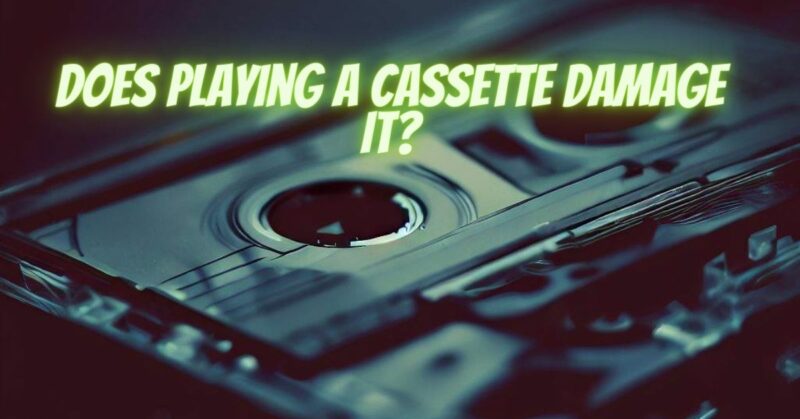Cassette tapes, once the primary medium for music lovers to enjoy their favorite tunes, have become iconic relics of the past. Despite the rise of digital music formats, cassette tapes still hold a special place in the hearts of collectors and nostalgic enthusiasts. However, a common question arises among cassette aficionados: does playing a cassette damage it? In this article, we will explore the intricacies of cassette tape mechanics and the potential impact of playing them on their overall condition.
Understanding the Cassette Tape
Before diving into whether playing a cassette damages it, let’s take a closer look at how these analog marvels work. A cassette tape consists of two spools that house a length of magnetic tape. The magnetic tape carries the audio signal in the form of magnetized particles. As you play a cassette, the tape moves from one spool to another, passing over various components such as the tape head and capstan.
Mechanics of Playback
Playing a cassette tape involves several mechanical processes, and it’s essential to understand these mechanisms to determine whether they can cause damage:
- Tape Head Contact: The tape head is the crucial component that reads and writes audio signals on the tape. During playback, the tape head makes direct contact with the magnetic tape’s surface. This contact is gentle, and the head is designed to read the magnetic information without causing harm.
- Capstan and Pinch Roller: The capstan and pinch roller work together to ensure proper tape tension and consistent playback speed. They hold the tape steady and minimize the risk of tape snags or damage during playback.
- Tape Speed: Cassette tapes typically play at a standard speed, ensuring a uniform rate of tape movement. This consistency is crucial for accurate audio reproduction.
Potential for Damage
Now that we’ve outlined the mechanics of cassette playback, let’s address the question: Does playing a cassette damage it?
In general, playing a cassette tape, when done correctly with a well-maintained player, should not cause significant damage to the tape itself. Modern cassette players are designed to minimize wear and tear during playback. The components, such as the tape head and capstan, are engineered to be gentle on the tape.
However, there are factors that can increase the risk of damage:
- Poorly Maintained Equipment: If your cassette player is in poor condition or has misaligned components, it can put additional stress on the tape and cause damage over time. Regular maintenance and servicing are essential to prevent this.
- Repeated Playback: Constantly rewinding, fast-forwarding, and playing the same cassette may lead to increased wear on specific sections of the tape, potentially causing audio quality degradation.
- Extreme Conditions: Exposing cassette tapes to extreme temperatures, humidity, or direct sunlight can lead to deterioration of the magnetic tape, affecting playback quality.
- Low-Quality Tapes: Cheap or low-quality cassette tapes are more prone to damage during playback than high-quality tapes.
In conclusion, playing a cassette tape should not inherently damage it if you use a well-maintained cassette player and handle your tapes with care. However, like any analog medium, cassette tapes are not immune to wear and tear over time. To preserve your cassette collection, store them in a cool, dry place, avoid extreme conditions, and periodically clean and maintain your cassette player. With proper care, your cassette tapes can continue to provide a nostalgic and enjoyable listening experience for years to come.


